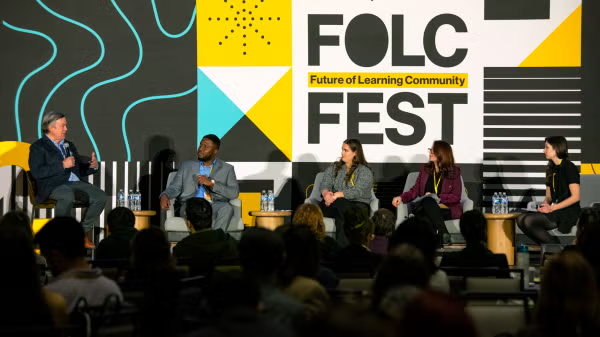Global Launch at ASU marks 50 years of teaching English, welcoming international students

Trips to Arizona sites like Sedona are part of the Global Launch experience for international students at ASU. Photo courtesy of Global Launch
When Zainab Al Nasr came to Arizona State University from Saudi Arabia in 2017, she learned English in a classroom, but she also learned it playing board games and singing karaoke.
Al Nasr participated in Global Launch, which teaches English to international students and helps them to adjust to life at ASU.
“Global Launch really prepared me to go to ASU,” said Al Nasr, who was admitted to ASU in 2018 and graduated in 2023. She credits her English-language coursework with helping her get her degree in supply chain management.
“Even if you were just feeling homesick or missing your family, they will help you in every way that they can,” she said.
Global Launch, which is marking its 50th anniversary this fall, has been the gateway to a university degree and a new life for more than a million international students. Besides the critically important work of teaching English, Global Launch creates a supportive community and keeps the students on track with coursework and documentation.
“A lot of people would describe us as a soft landing place for international students,” said Dianna Lippincott, director of Global Launch.
“They’re new to the country and they need all kinds of help. Maybe it's with finding an apartment or going to the doctor or finding the grocery store or finding food from their country.
“We provide those kinds of services. We have a welcome desk where anything they need to navigate the university, we help them with.”
Global Launch by the numbers
For the 2023 academic year, Global Launch:
- Enrolled 1,054 students on campus.
- Enrolled 332,945 students in online courses.
- Served learners from 63 countries.
- Generated $5.3 million in revenue.
- Employed 38 instructional professionals who speak 35 languages among them.
Over the past 50 years, the unit has been known by several names. It started in 1974 as the English Skills Program. The name was later changed to the American Language and Culture Program, and then again to the American English and Culture Program. In 2015, it became Global Launch.
One of the main goals of Global Launch is to prepare international students of any proficiency level to speak, read and write English in an ASU degree program. They must be able to participate in group projects, write academic papers, communicate with their professors and give presentations.
The basic English Language Program is offered online or in person and has six levels. Students take a placement test to determine their level, and upon completion, can waive the English test — a huge benefit for those with test anxiety — before beginning their degree coursework.
The eight-week English for Admissions and Achievement course is for undergraduates or graduate students with some English who can take the class as an alternative to the proficiency exam or to boost their skill at writing papers.
International students who don’t meet the ASU admission requirements can join the ASU-USA Pathways, in which they take general-education courses along with English-language and academic-support classes for one to three semesters. At the end, if they meet the requirements, they can be admitted to an ASU degree program with up to 27 transferrable credits.
Chris Bragg started at Global Launch in 2001 as an English teacher and is now a student advisor. He speaks fluent Japanese but rarely does so with Global Launch students from Japan.
“We try to stick to English as much as possible because that's what they're here for. And in the long run, they appreciate it,” he said.
With its tricky grammar, English is difficult to learn, Bragg said.
“I'm really impressed with how our students do. Theoretically, they could go from zero English to enough English for ASU in 14 months.”
Global partners
Besides working with international ASU students, Global Launch also partners with clients in several English-language initiatives around the world.
- Universities in other countries often ask Global Launch to create short-term immersive experiences for their students. “They want to provide the U.S. college experience for a few weeks and see what it’s like to be on campus and have some lectures from our faculty,” Lippincott said.
- Global Launch has created industry-specific online coursework, including “English for Health Care” and a new “English for the Semiconductor Industry” initiative that has reached more than 10,000 learners in Mexico. The team worked with a local semiconductor expert for subject-matter expertise.
- “Teach English Now” trains people in other countries who want to become English teachers, offering coursework that can lead to a TESOL certificate — required for employment. “We probably have about 10,000 learners in that program at any given time,” Lippincott said.
- This semester, Global Launch educators are conducting research in partnership with National Sun Yatsen University, funded by the Taiwan Partner Initiative Grant. The project will help the university improve its English-language program to meet goals of the Taiwan Bilingual 2030 policy.
Technology has empowered the Global Launch mission.
“Right now, a lot of countries are having trouble getting student visas. We know in some countries they have to wait a year to get an appointment to see if they can get a visa,” Lippincott said.
“But that’s part of why we have online — so they can get started.”
Global Launch also is harnessing artificial intelligence. While international students have plenty of opportunities to practice speaking English with their American peers, they are sometimes self-conscious, Lippincott said. Now they can practice in a virtual-reality lab with an AI partner.
“We found that it is effective, especially for students that might be a little shy,” she said.
“They can practice the same thing over and over and the AI doesn't mind.”
Part of the journey
Bragg is a troubleshooter for the various glitches that come up with international students, especially with visa paperwork.
“In order to maintain their student status, they have to study full time every session, and sometimes they get tired,” he said.
“But if they skip a session, they have to leave the U.S. and then get new documentation to come back. So I have to communicate with them about the rules and how to navigate them.”
Sometimes he has to be creative. Typically, students must either complete their Global Launch coursework or pass the English-proficiency test to be admitted to ASU, but several years ago, due to an oversight, a PhD student was admitted without doing either of those. Bragg was able maneuver the situation so that the student could take his Global Launch course concurrently with his PhD program.
“I didn’t hear from him for a couple of years and then one day, he stopped by and gave me an article,” Bragg said.
The student, Chalachew Seyoum, had been part of an ASU team that in 2013 found a human jawbone in Ethiopia that was considered the earliest evidence of the human genus. Seyoum is now an assistant professor at the University of Arizona College of Medicine in Phoenix.
“And I was so proud that we were a part of his journey,” Bragg said.
Having English-language immersion on campus is one reason ASU has been able to expand access for refugee students in recent years. For example, in December 2021, ASU welcomed more than 60 young Afghan women who were fleeing the violence in their homeland.
“That one was special because it was the first time ASU had done something like that and it was a very large group,” Lippincott said.
“But we had experience with large groups, and it’s our privilege to be able to work with those students.”
This semester, ASU accepted two young women from Somalia under the new Welcome Corps on Campus refugee-resettlement initiative, and they’re now participating in Global Launch.
“It’s one of our specialties and part of the soft landing place,” Lippincott said.
Finding friends
Activities like trips to Sedona, a Thanksgiving celebration and cheering at football games are important not only to boost the students’ English skills, but to provide fun and socialization.
“It encourages them to get out rather than sitting at home and feeling like, ‘I don't have friends.’ They know they have people they can be with,” Lippincott said.
Global Launch students are offered activities such as “Conversation Café,” recreation time at the Sun Devil Fitness Center and “Global Hangout,” a lunch-time gathering for games.
After completing her English language coursework, Al Nasr stayed at Global Launch as a volunteer and then was employed as an activities assistant. She feels like she was able to make a difference.
“Especially for our Muslim women, I know how shy they can be and I know that some of them will refrain from going to these activities because it’s outside of their comfort zone,” she said.
“But when other Muslim students see me there, they get excited. And this really helped them come back again for other activities.
“I'm really glad that I had this impact.”
More Sun Devil community

How 2 women who call each other 'sis' raised ASU running back Kyson Brown
The Lancaster High School graduation ceremony has just ended, and running back Kyson Brown poses for a photo with the two most important people in his life. ASU…

FOLC Fest 2025 explores Principled Innovation, leadership and learning at ASU
"Principled Innovation is about using our creativity, knowledge and resources to make decisions that ultimately benefit humanity — not just in the short term, but for generations to come."That's what…

These Sun Devils are inspiring the next generation of female athletes
This year, Women's History Month is celebrating the theme “Moving Forward Together! Women Educating and Inspiring Generations.”Women in sports inspire fans of all ages through their accomplishments…


